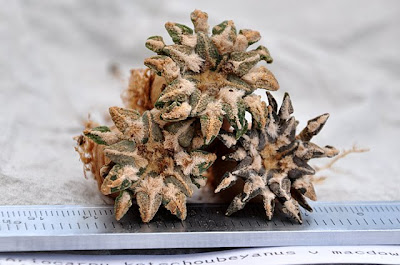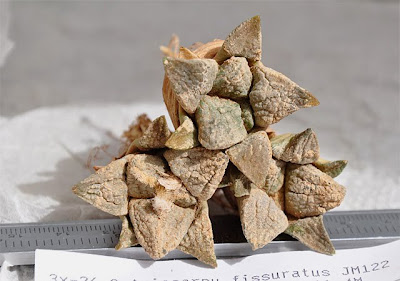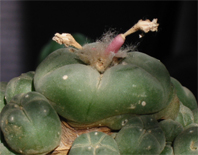I'm not a seasoned Ariocarpus grower but still in a slow but steady process of building a collection of these magnificent plants. I'm learning to handle the deep levels of patience required to grow Ariocarpus from seed, but sometimes I give in to my eagerness and have to buy a few plants ;-)
Ariocarpus kotschoubeyanus v. macdowellii
I like Mesa Garden's hard grown plants that almost invariably come with locality information. As I live in Denmark and Mesa Garden is located in New Mexico it is quite cumbersome and expensive to import plants (I once contacted the Danish plant directorate to get directions on importing cacti from countries outside of the European Union and was told it would involve import permits, CITES and phytosanitary documents plus an inspection of the plants upon arrival). To work around these obstacles I order plants whenever in the US and have them shipped to my hotel; from there they travel to Denmark packed in my suit case.
Ariocarpus kotschoubeyanus v. macdowellii, side view
I have only praise for the service offered by Mesa Garden, they are always responsive and extremely helpful in arranging timely deliveries - even within very short windows of time. Remember to specify substitutes, though. 
Ariocarpus fissuratus
I spent part of my summer vacation in New York City and again took the opportunity to order plants and seeds from Mesa Garden. Apart from the Ariocarpus kotschoubeyanus var. macdowellii (SB 100; El Pilar, Coahuila) and A. fissuratus (JM 122; Fort Stockton, Texas) featured in this post, I also ordered some Ariocarpus intermedius and A. retusus. Unfortunately Steven was out of the varieties I ordered of the latter two species, and I forgot to specify substitutes and consequently received only half of the plants that I ordered. Disappointing as it may be not to receive all the plants you are eagerly expecting, this is the only approach that makes sense (especially when you are focusing on the finer details like locality information) - I for sure would have been disgruntled to receive random substitutes as I was going specifically for the more cold hardy varieties of Ariocarpus as these plants will be growing in my cold house. I'll remember to specify substitutes with my next order ;-) 
Ariocarpus fissuratus, side view
As usual the plants received from Mesa Garden are compact and healthy. The Ariocarpus kotschoubeyanus var. macdowellii (SB 100; El Pilar, Coahuila) plants are approximately 4 cm high and 2.5 cm wide while the A. fissuratus (JM 122; Fort Stockton, Texas) plants are 4.5 cm high (excluding the fine roots) and 3.5 cm wide.
The plants were potted in the soil mix described in a recent post. The photo below illustrates quite well that these plants are so “cryptic” that you can walk right past them or trample them underfoot in the wild without noticing it, especially the A. fissuratus plants are extremely well camouflaged in this case.
Newly potted Ariocarpus plants
Lately I have been taken by Echinocactus and thus also ordered 100 seeds each of Echinocactus horizonthalonius (SB 409; Shafter, Texas), E. polycephalus (SNL 91; Las Vegas, Nevada), and E. texensis (SB 2006; Roosevelt Co, New Mexico) - E. texensis is also known as Homalocephala texensis. I'm completely new to raising Echinocactus from seed and decided to do a test run a couple of months ago, using only a few of the seeds (as it was very late in the season for seed starting). I scarified the seeds by rubbing them against a whetstone and soaked them in water for 24 hours. Today 25% of the E. texensis and 10% of the E. horizonthalonius have germinated while the E. polycephalus seeds still show no signs of activity. I know that the seeds probably need more heat and light than I can supply at this time of year, in order to germinate properly.
If you have more advice on starting Echinocactus from seed (especially the above mentioned species ;-) I would love to learn about it.
Mitteilungen der Deutschen dendrologischen gesellschaft. 1924 (added:
01/12/2026)
-
*By:*
Deutsche Dendrologische Gesellschaft
*Publication Info:*
Wendisch-Wilmersdorf; [etc.] Thyrow (Kr. Teltow), [etc.]
*Call Number:*
QK1 .D49
*Contributing...
4 weeks ago



















Ariocarpus are fascinating little cacti! I love the fact that they do take a little bit longer to grow than most things, and eagerness can come. I can agree with you in your point about finding a great seller who provides notes from wherever the particular specimen was wild crafted, one of my favorites, SacredSucculents does just that. I recommend you look into them. I will be following your blog from now on and hope you take a look at mine. I have just started and I work on a minimum budget, but hopefully you will be able to give me some feedback with the cacti related posts.
ReplyDeletePartager, nice blog. I especially like your post on Delosperma. I've never started Delosperma from seed but am growing a few winter / frost hardy species in my outdoor beds - they are great plants.
ReplyDelete